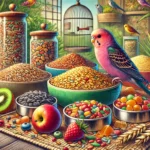Small birds, from finches and canaries to parakeets and lovebirds, bring joy and vibrancy to any home. As responsible pet owners, ensuring these feathered friends receive a nutritious and balanced diet is essential for their health, longevity, and happiness. While commercial bird treats and diets are readily available, understanding the right mix of grains, fruits, and seeds can elevate your bird’s health and keep them chirping cheerfully.
Understanding the Nutritional Needs of Small Birds
Every species of small bird has unique dietary requirements. However, most small birds thrive on a mix of grains, fruits, and seeds, complemented by occasional bird treats and fresh water. A proper diet ensures:
-
Healthy feathers and vibrant plumage
-
Strong immune system
-
Better energy levels and activity
-
Improved reproduction and egg health
A lack of balanced nutrition can lead to poor health, behavioral issues, and reduced lifespan.
The Role of Grains in Small Bird Diets
Grains form an essential part of small bird food. They are a vital source of carbohydrates, proteins, and essential nutrients. Popular grains for small birds include:
-
Millet: Highly digestible and a favorite among finches and canaries.
-
Quinoa: Packed with protein and amino acids.
-
Oats: A great source of fiber and energy.
-
Rice: Cooked brown rice offers a nutritional boost.
Grains should be clean, pesticide-free, and stored in a cool, dry place to prevent mold.
The Importance of Fruits in a Bird’s Diet
Fruits add variety and essential vitamins to a small bird’s diet. They are a natural source of hydration and antioxidants. Some popular fruit choices include:
-
Apples (seedless): Rich in vitamins A and C.
-
Bananas: A source of potassium and natural sugars.
-
Berries: Packed with antioxidants.
-
Grapes: Hydrating and sweet.
When offering fruits, ensure they are fresh, washed thoroughly, and free from pesticides. Remove seeds from fruits like apples, as they can be toxic to birds.
Seeds: The Staple of Small Bird Nutrition
Seeds are often a favorite among small birds, but they shouldn’t make up the entire diet. While seeds provide fats and proteins, an all-seed diet can lead to obesity and vitamin deficiencies. The best seed choices include:
-
Sunflower Seeds: Energy-rich but should be given in moderation.
-
Canary Seeds: A staple for many small bird species.
-
Flax Seeds: Provide omega-3 fatty acids.
-
Hemp Seeds: Nutrient-dense and high in protein.
Seeds should always be offered in combination with other food groups to ensure balanced nutrition.
Balancing the Mix: How to Create an Ideal Small Bird Diet
A well-rounded diet should consist of approximately:
-
50% Grains
-
30% Seeds
-
20% Fruits and Vegetables
Additionally, specialized bird treats can be given occasionally to provide extra enrichment. Treats like honey sticks, fruit-flavored pellets, or millet sprays are favorites among small birds.
Tips for Feeding Small Birds:
-
Rotate food regularly to avoid monotony.
-
Avoid processed or sugary human foods.
-
Always provide fresh water.
-
Clean food dishes daily to prevent bacterial buildup.
Common Mistakes to Avoid When Feeding Small Birds
-
Relying Only on Seeds: A seed-only diet lacks essential nutrients.
-
Overfeeding Fruits: Too much fruit can lead to digestive issues.
-
Ignoring Hydration: Birds require constant access to clean water.
-
Infrequent Diet Changes: Birds enjoy variety and nutritional diversity.
By avoiding these common mistakes, you can ensure your bird stays healthy and active.
Enhancing Bird Diets with Bird Treats
Bird treats are not just indulgences; they serve as tools for training, bonding, and dietary supplementation. Treats like dried fruit mixes, nut clusters, and seed bells offer both nutrition and entertainment for birds. However, treats should make up no more than 10% of their daily diet.
When shopping for bird treat and small bird food, opt for trusted brands and suppliers. Online pet supplies stores offer a wide variety of high-quality options, making it easier to cater to your bird’s preferences.
The Benefits of Shopping for Bird Products Online
Buying small bird food and bird treats online offers several advantages:
-
Convenience: Easily compare products and prices.
-
Variety: Access to specialized blends and premium brands.
-
Product Reviews: Read feedback from other pet owners.
-
Auto-Ship Options: Never run out of essential supplies.
Online platforms often offer discounts and subscription services, ensuring you’re always stocked with the best products for your feathered friend.
Monitoring Your Bird’s Health Through Diet
A well-fed bird will exhibit:
-
Bright and smooth feathers
-
Clear eyes
-
Active and playful behavior
-
Regular eating and drinking habits
If your bird shows signs of lethargy, loss of appetite, or unusual droppings, consult an avian veterinarian immediately.
FAQs About Feeding Small Birds
Q1: Can I feed my bird only seeds?
No, seeds should be part of a balanced diet, not the sole source of nutrition.
Q2: How often should I give bird treats?
Treats should be given occasionally, no more than 10% of their diet.
Q3: Are there any fruits birds should avoid?
Yes, avoid avocado, chocolate, and fruit seeds (like apple seeds).
Q4: Can small birds eat rice?
Yes, cooked brown rice is safe and nutritious.
Q5: Is it better to buy small bird food online or in-store?
Both have benefits, but online shopping offers convenience, variety, and better pricing.
Conclusion: Ensuring a Balanced Diet for Your Feathered Friend
Feeding small birds a balanced diet rich in grains, fruits, and seeds ensures they live a healthy, happy life. By incorporating occasional bird treats and shopping from reliable online pet supplies stores, you can simplify the process while guaranteeing top-quality nutrition.
A well-fed bird is not only a joyful companion but also a vibrant addition to your home. Take the time to understand their dietary needs, monitor their health, and provide them with the care they deserve. With the right diet and love, your feathered friend will thrive for years to come.


